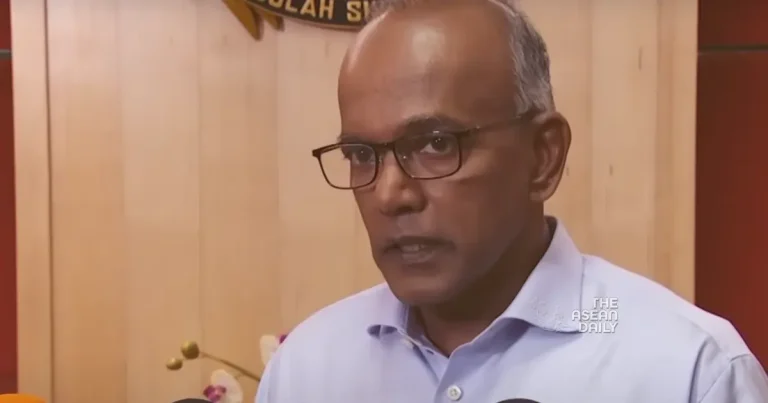28-6-2024 (SINGAPORE) Singapore remains a highly attractive target for terrorist groups, and the recent attacks and arrests in neighboring Malaysia underscore the need for heightened vigilance against such threats, Law and Home Affairs Minister K Shanmugam cautioned on Friday (Jun 28).
Speaking to the media at the Civil Service Club in Tessensohn Road, Mr. Shanmugam emphasized that due to the close proximity between the two countries, any security incident across the Causeway will inevitably have an impact on Singapore’s security landscape.
The threat is amplified by the prevalence of the Islamic State’s (ISIS) violent ideology in the region, coupled with the ability of attackers to carry out assaults using readily available items, he added.
While there are currently no specific threats detected in Singapore, the Minister urged everyone to remain vigilant and report any suspicious activities or behavior to the authorities.
Mr. Shanmugam’s remarks come in the wake of the recent arrests of eight individuals by the Royal Malaysia Police (PDRM) last weekend for alleged links to the ISIS group. The simultaneous operations across four states saw the detention of six men and two women, aged between 25 and 70.
Investigations revealed threats against Malaysia’s King, Sultan Ibrahim Sultan Iskandar, Prime Minister Anwar Ibrahim, dignitaries, and senior police force officials, according to Malaysian Home Minister Saifuddin Nasution Ismail.
The Minister commended the Malaysian Special Branch’s actions against terrorism suspects, stating that such measures “significantly mitigate the threat to Singapore and the region.”
“Our security is closely linked to Malaysia’s security. Due to proximity, what happens in Malaysia will have an impact on our security landscape,” he said, citing Singapore’s past experience with the Jemaah Islamiah (JI) terror group.
In December 2001, the Internal Security Department (ISD) thwarted attacks on locations in Singapore, including Yishun MRT Station and key military installations like the Ministry of Defence Headquarters at Bukit Gombak. After the initial arrests, JI members regrouped in Malaysia and plotted retaliatory attacks against Singapore.
“We remain a very important target for terrorists,” Mr. Shanmugam emphasized.
The Minister highlighted that the violent ideology of ISIS “continues to resonate in this region, and is fueled by a virtual network of supporters.” He warned that extremist narratives have radicalized individuals, including Singaporeans, and as long as these ideologies persist, they will continue to inspire attacks.
The ISD conducts regular assessments on the threat level in Singapore, factoring in regional incidents like the recent events in Malaysia, although Mr. Shanmugam noted that these did not come as a significant surprise given the prevalence of ISIS ideology across the region.
Mr. Shanmugam also drew attention to the evolving methods employed by attackers, who can now use easily available items such as knives or vehicles to carry out assaults, as witnessed globally and in the recent Ulu Tiram police station attack in Malaysia last month.
In that incident, a machete was used by a JI member who killed two police officers and injured another before being fatally shot. The attacker, 21-year-old Radin Luqman, had come prepared with a bag of metal sheets and a bulletproof vest, suggesting the “brazen attack” was premeditated, according to the Minister.
Radin Luqman’s father, Radin Imran, a former JI member who had reportedly shifted allegiance to ISIS and radicalized his family members, was also found to possess four homemade air rifles, potentially indicating plans for further attacks.
Amid these evolving threats, Singapore has adopted stringent measures to ensure its security, particularly in light of increasing cross-border movement, with over 460,000 travelers crossing daily between Singapore and Malaysia through the two Causeways.
The Immigration and Checkpoints Authority (ICA) conducts rigorous checks at the borders, which may sometimes cause delays, but Mr. Shanmugam emphasized that these measures are crucial for public safety.
Singapore also maintains close cooperation and intelligence sharing with various foreign partners, including the Malaysian Special Branch, which the Minister described as “very important to deal with current and emerging threats.”
While there are currently no specific threats detected in Singapore, the ISD has identified and issued orders under the Internal Security Act to 50 self-radicalized individuals since 2015, including 38 Singaporeans and 12 foreigners.
Mr. Shanmugam stressed that while government agencies like the ISD and police will do their utmost to detect and prevent any terrorist attack, the entire society must play its part by remaining vigilant, reporting suspicious activities, and participating in the SGSecure movement.
“We don’t wait for the threat to materialize or be about to materialize, and we don’t take chances,” he asserted, underscoring the nation’s zero-tolerance policy toward terrorism.




